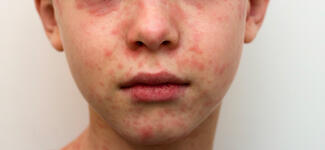
What to Know about Chickenpox
Every year, thousands of Americans develop the telltale, itchy rash of chickenpox. While vaccination has dramatically reduced cases nationwide, understanding this common childhood disease remains important for parents, caregivers, and adults who never had the infection or vaccine. That’s because in recent years, the medical consensus around chickenpox has shifted, with increased focus on the potential serious complications it can cause.
Here’s what to know about chickenpox, and how to best protect yourself and others.
What Is Chickenpox?
Chickenpox is an itchy, blister-like rash caused by the varicella-zoster virus. If one person in a household has it, up to 90% of non-immune family members will catch it too, making it one of the most contagious childhood diseases. That’s because the virus spreads easily through the air when someone coughs or sneezes, or by direct contact with fluid from the blisters. Before a vaccine became available in 1995, chickenpox affected approximately 4 million Americans annually.
What many people don't realize is that after recovery, the virus doesn't leave your body. Instead, it remains dormant in your nerve tissues for decades. Later in life, this virus can reactivate as shingles — a painful, blistering rash typically appearing on one side of the body.

Who’s at Risk?
While anyone can get chickenpox, it most commonly affects children under age 12. Prior to 1995, chickenpox was one of the most common childhood diseases, affecting almost all children before the age of 9.
Children with chickenpox typically experience milder symptoms than adults but can still face complications. The AAP emphasizes that even in otherwise healthy children, chickenpox can lead to serious complications and sometimes death.
Signs and Symptoms
Chickenpox typically develops in stages over four to seven days. Early symptoms often appear one or two days before the rash and may include:
- Fever
- Fatigue
- Loss of appetite
- Headache
The most recognizable sign is an itchy rash that progresses from small red bumps to fluid-filled blisters that eventually form scabs. The rash usually starts on the chest, back, and face before spreading across the entire body, potentially including inside the mouth and eyelids.
Potential Complications
While most healthy children recover without issues, chickenpox can lead to serious complications, such as:
- Bacterial skin infections, including Group A streptococcal infections
- Pneumonia (lung infection)
- Encephalitis or cerebellar ataxia (brain infection or swelling)
- Hemorrhagic complications (bleeding problems)
- Sepsis (bloodstream infection)
- Dehydration
Before widespread vaccination, chickenpox caused approximately 100-150 deaths annually in the United States. Today, hospitalizations and deaths are rare thanks to the U.S. chickenpox vaccination program, though unvaccinated individuals remain at risk.
Staying Safe
The chickenpox (varicella) vaccine is the most effective way to prevent infection. The CDC recommends the following immunization schedules:
- Children
- First dose: 12-15 months of age
- Second dose: four to six years of age
- Individuals 13 years or older without immunity
- Two doses four to eight weeks apart
The vaccine is highly effective, preventing almost all cases of severe illness. If a vaccinated person does get chickenpox — called “breakthrough chickenpox” — the symptoms are usually mild with fewer to no blisters and low or no fever.
Shingles: A Later-Life Concern
Many older adults have heard about shingles, a painful rash that typically affects one area of the body. If you had chickenpox as a child, the virus stays dormant after recovery, and can reactivate years or decades later, causing shingles.
The CDC recommends Shingrix (recombinant zoster vaccine) for adults 50 years and older, as well as for adults 19 years and older who have weakened immune systems. Two doses of Shingrix provide strong protection against shingles and postherpetic neuralgia (PHN), the most common complication of shingles. You should get vaccinated even if you've previously had shingles or received an older shingles vaccine (Zostavax).
Free Vaccinations at AltaMed
We believe everyone deserves protection from preventable diseases. That’s why AltaMed provides all CDC-recommended vaccinations, including for chickenpox, free of cost. This service includes childhood and adolescent immunizations for patients from birth through age 17 years, as well as adult vaccinations.
Call us at (888) 499-9303 to schedule an appointment for you and your family.


